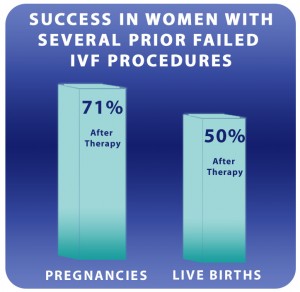Sexual intimacy and intercourse should provide some of life’s greatest pleasures. But because the female urogenital and  reproductive organs are very susceptible to adhesions, intercourse can become painful, dissatisfying, and embarrassing. Many women still believe the old misconception that “there isn’t anything that can be done,” or “it’s just the way it is,” or “my mother didn’t enjoy sexual intimacy and neither did hers, therefore I won’t be able to either.”
reproductive organs are very susceptible to adhesions, intercourse can become painful, dissatisfying, and embarrassing. Many women still believe the old misconception that “there isn’t anything that can be done,” or “it’s just the way it is,” or “my mother didn’t enjoy sexual intimacy and neither did hers, therefore I won’t be able to either.”
If you are not satisfied with sexual intercourse, you are not alone. Did you know:
-
approximately 50% of all US women and 43% of women aged 18-59 experience female sexual dysfunction (FSD) according to data from Urology and the Journal of the American Medical Association?
-
in 2000, the Journal of Sex & Marital Therapy classified female sexual dysfunction into six measurable domains: desire, arousal, lubrication, orgasm, satisfaction, and pain.
-
intercourse pain affects between 46% and 60% of all US women, according to reports in American Family Physician (2001) and Obstetrics & Gynecology (1996).
Although sexual dysfunction and intercourse pain are prevalent among women, these conditions should not be considered “normal” or “untreatable.” A study published by the Journal of Sexual Medicine (2006)1 found that many female competitive bicyclists experienced decreased genital sensation. The researchers found that external genital nerves and arteries were negatively affected by being directly compressed in women who consistently cycled an average of at least 10 miles a week, four weeks per month. The results of their study can also be applied to other physical activities such as horseback riding.
Other known causes of sexual dysfunction and intercourse pain include bladder infections, yeast infection, inflammatory disorders, sexually transmitted diseases, pelvic surgeries, physical or sexual abuse, etc. All of these conditions can cause adhesions to form within in the reproductive tract. Adhesions can restrict and blanket the delicate structures of the reproductive system, causing decreased sensation (such as in the bicyclists) or painful intercourse.
So what can a woman do once she experiences sexual dysfunction or painful intercourse? First, she should speak with her doctor to make sure there is not a greater problem at hand, such as endometriosis or a sexually transmitted disease. The doctor can then ascertain if the vulva has been damaged in any way and determine the proper treatment.
Our therapists have helped many women overcome pelvic pain and dysfunction. Request a free phone consultation with an expert therapist to learn more about our treatment.
“Our results: sexual function and pain level improvements”

- 93% of women in the natural fertility study reported decreased pain 2
- 96% of sexual function study participants reported reduced sexual intercourse pain 3
- 56% had improved or first-time orgasms 3
- 65% had increased satisfaction 3
- 70% had increased lubrication 3
- 74% had increases in their arousal 3
- 78% had greater or renewed desire (libido) 3
- 91% had overall increased sexual function 3
References
- Marsha K. Guess, Kathleen Connell, Steven Schrader, Susan Reutman, Andrea Wang, Julie LaCombe, Christine Toennis, Brian Lowe, Arnold Melman, Magdy Mikhail “Genital Sensation and Sexual Function in Women Bicyclists and Runners: Are Your Feet Safer than Your Seat?” Journal of Sexual Medicine. Vol 3, No 6.
- Wurn BF, Wurn LJ, King CR, et al. Treating female infertility and improving IVF pregnancy rates with a manual physical therapy technique. Medscape General Medicine. 2004;6(2). Available (registration required) at http://www.medscape.com/viewarticle/480429.
- Wurn LJ, Wurn BF, King CR, et al. Increasing orgasm and decreasing dyspareunia by a manual physical therapy technique. Medscape General Medicine. 2004;6(4). Available (registration required) at http://www.medscape.com/viewarticle/493989.
Related Content:
- Intercourse Pain
- High Success Rates Treating Intercourse Pain, Naturally
- Three Common Causes of Deep Penetration Pain
- Sexual Health in Women Experiencing Sexual Pain: The Answer
- Causes of Decreased Sensation During Intercourse
- Overcoming Intercourse Pain: Reclaiming Desire and Orgasm
- You Don’t Have to Cope with Painful Intercourse While Trying to Conceive





















